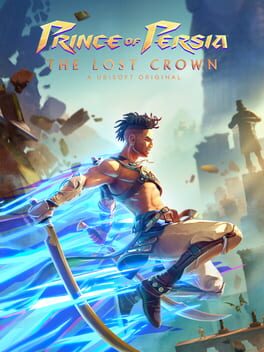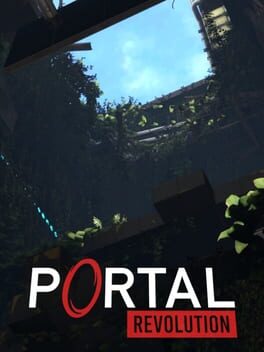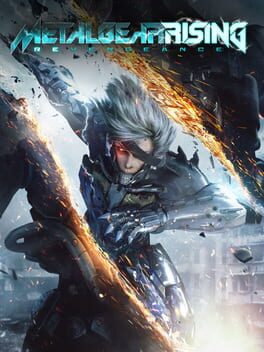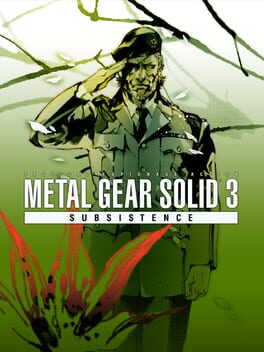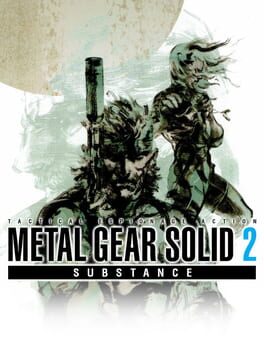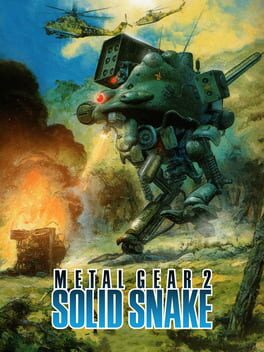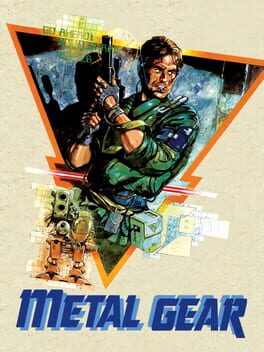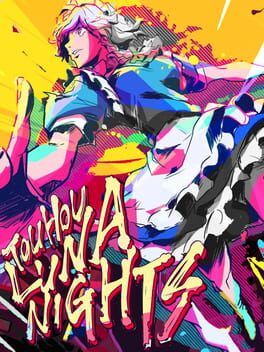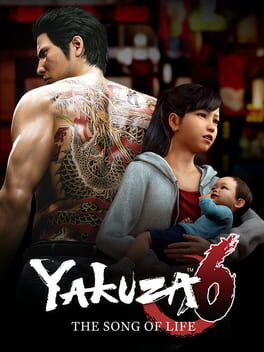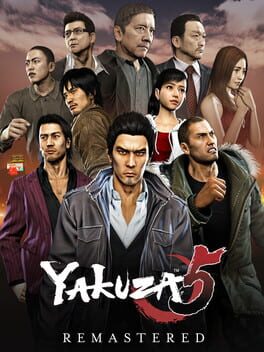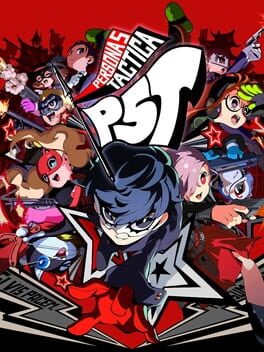Sebs
BACKER
A future classic metroidvania. There were definitely some compromises made to get this to work on a Nintendo Switch, and it shows. Some of the character animations are kinda cheap looking, and while the art style is very fun, I almost wish it could have been a bit more refined. Additionally, I think the choice to have teleporters separate from bonfires (trees) was a mistake with how big the map is. But despite this, the boss design and combat is incredible, alongside how much variety the map had. Finding different powers (including some really surprising ones) felt really really good. The story is a little lackluster but it takes itself seriously and I appreciated that. I wish the ending had a couple more minutes to wrap things up a bit better if anything.
And I spent so long on this game! 28 hrs on a metroidvania is super sick. Just a great game overall.
And I spent so long on this game! 28 hrs on a metroidvania is super sick. Just a great game overall.
This review contains spoilers
The Man Who Sold The World and The Man Who Saved It: A Short Retrospective on The Metal Gear Franchise
Note: this review covers my thoughts and feelings about the entire Metal Gear Franchise. Please skip to the bottom for my thoughts on just MGSV. Spoilers for each game follow.
Metal Gear
On December 23rd, 2023, I sat down and opened Metal Gear for the NES. Yes, the NES version, and not the MSX version. By today's standards, it's not a good game. The environments are bland, the combat is clunky, and the inventory systems are frustrating at best - debilitating at worst.
Despite this, it did two things that immediately kept me on the line: for one, the game is actually interesting. It's finishable. Not to come off as a Gen Z-er that can't play old games, but if I'm being honest Metal Gear is supremely accessible for what it is and when it came out. The video-gamey name of Big Boss and the interesting appearance of Gray Fox are chuckle worthy at a glance, and it creates a really unique tone that stays all the way throughout the series until (I'd argue) Metal Gear Solid 3: Snake Eater.
The other thing that Metal Gear does that creates its appeal is actually in conjunction with Metal Gear 2: Solid Snake. It's the birth(s) of the stealth gameplay system.
^not the first but you know what I mean.
Metal Gear 2: Solid Snake
In Metal Gear 2: Solid Snake, it seems to be played off as a
fun, slightly bullshit revival when Big Boss is revealed to be alive. But, it never mattered because these are NES era games. Hell, I welcomed it. Despite my frustration with Metal Gear, I really do think that Big Boss was interesting, even though I never knew anything about him. It even wasn't until later on in this series that I realized how important these events are.
On its own, though, this game is actually really decent. I can fully see why these games became a phenomenon when it comes to this game, despite its clunky backtracking and flawed UX/design philosophy.
Metal Gear Solid
Metal Gear Solid is finally a turning point in quality though - while there are many conventions established before this game, they're all solidified by this entry. The codec calls, the saving, the fourth wall breaks, the actually excellent stealth - it's all perfect. Moments like Psycho Mantis' boss fight, or the end credits scene are stand out moments to an already great game with inventive boss fights and wonderful level design. I do take most issue with the final boss sequence, which is honestly pretty frustrating because everything else is so good. But as an entry in the franchise, it's evident why almost every game that followed carried the SOLID subtitle.
There are a few negatives that have been carried through the series thus far, though. By this point in the series, the very genes of the series include incessant backtracking, frustrating combat (even in Solid, at times), difficult menu-ing, and despite some interesting stories, the characters sometimes feel flat.
Metal Gear Solid 2: Sons of Liberty
Metal Gear Solid 2: Sons of Liberty changes everything. It's impossible to put into words what makes this game special even among the series' entries. I can say with certainty that this is its best entry, in my opinion. The ending in particular is possibly one of the best, albeit indulgent, hours of gaming created thus far.
I am fully aware of the disdain for Raiden at this point. I unequivocally disagree with this general take. His tragic story felt very new and fresh for the series. While I liked Solid Snake, I knew that there was very little they could do to make him interesting at that point. Making him a side character, honestly, was one of the best options. He's characterized through Raiden, who's juggling conversations with "Rose" and "The Colonel" alongside completing his mission. The map design almost mirroring a Resident Evil type game with its comfortable, samey, yet easy to backtrack and explore design was a huge plus. This is especially true retrospectively. Again, the series exemplifies incredible boss design and it boasts possibly the best story in the franchise.
Metal Gear Solid 3: Snake Eater
Metal Gear Solid 3: Snake Eater feels like the next turning point in design philosophy. I almost would split the franchise in three parts - this game is the beginning of the second part. This is the beginning of the linear, mission-based gameplay. This game also contains possibly one of the best video game OSTs in the medium, alongside, again, an incredible story. (Getting a little repetitive, right?) Playing as Big Boss was an extremely interesting experience, especially knowing what he was to become later in the series' timeline. The End, The Sorrow, and The Fear are three of the series best boss fights, and the franchise as a whole has another tone setter in this game.
However, this game also marks a turning point in its intended audience. This, of course, is not necessarily a bad thing. However, it becomes more evident from this point on that Kojima and Konami were developing for Western audiences more and more.
Metal Gear Solid 4: Guns of the Patriots
Metal Gear Solid 4: Guns of the Patriots continues that trend from the very beginning of the game. This game contains a new difficulty selection - the difference between Solid Normal and Naked Normal. A Western Normal, and an Eastern Normal. It mirrors an addition in Metal Gear Solid 2 and Metal Gear Solid 3 - the European Extreme - but this time, more and more players can engage with a difficulty select that mirrors Western audiences' capabilities with shooters. It's also more possible than before to play Metal Gear Solid 4 loud rather than quiet.
This game, from my understanding now, was not well received on launch. I think I can see why that was the case. Mission 3's tailing mission, Old Snake's addition and rationale for existence, and the cutscene lengths are especially unique to this entry. And yet, it finally feels like an ending to the franchise. And if I'm honest, it's a damn good ending. The twists are good, the last boss is amazing and mirrors everything great and bad about the franchise. It embraces it all. That's really Metal Gear Solid 4's strength.
The franchise could have just stopped there. I could have stopped playing the games and be happy the rest of my life knowing that the series ended there.
Both fortunately, and unfortunately -
Metal Gear Solid: Peace Walker
Metal Gear Solid: Peace Walker is my least favorite game in the series. Remember how I said that this franchise can be split into three parts? We're now fully in the last part. I'll save most of my main criticisms for this game when I get to Metal Gear Solid V, but there are so many things I fundamentally disagree with when it comes to the game philosophy going forward.
Reaching back into the franchise's roots, the game features plenty of misguided, absurd, and non-explanatory functionality especially surrounding its base building systems and Metal Gear Zeke building. It also features an absurdly convoluted secret ending sequence, which, to be open, I couldn't get! It's too hard! and literally every website has a different explanation on how to get it, and none of them worked. The gameplay mirrors Metal Gear Solid 3, but a lot of this game is part of the new push towards Fulton Gaming, or otherwise kidnapping the enemy for more base building. This is an art in and of itself, and it's a boring one.
Additionally, the time sink for this game, a PSP game, is abhorrent. It's really cool for those looking for a game to play long term, but as someone who played only the singleplayer functionality, it doesn't work. Metal Gear Zeke building also relies on repeated boss fights, which checks one of my gaming cardinal sin boxes.
Lastly, the story of this game is extremely lackluster, and the cutscene design is very hard to look at. This game also includes some really uncomfortable moments during cutscenes, such as being able to x-ray some characters' clothes.
Metal Gear Rising: Revengeance
I don't feel the need to say a lot about this game - it's been talked to death in the past three years. But I do have some criticisms that people don't typically talk about from what I usually see.
For one, the stealth in Metal Gear Rising is abhorrent if not nonexistent. The movement is way too clunky to do minute movements for stealth actions, and none of it works that way. Secondly, going into the game, I was happy to see more Raiden and in a role that people really like him in. But I realized pretty quickly that Raiden really has no personal attachment to the events transpiring like he does in 2 (and kinda 4). It's slightly disappointing. Lastly, the game lacks enemy variety and that is probably its biggest issue.
Again, I loved the game, but anything I could say about it has already been said a lot, very recently. As a side note: after playing Metal Gear Solid 4, it's really strange to know that people play this game standalone. The story doesn't work standalone lol. It is so necessary to play 4.
Metal Gear Solid V: Ground Zeroes and Metal Gear Solid V: The Phantom Pain
Alright. Finally. The ending of the entire franchise.
Let's get the comparisons to the previous entries out of the way. This game has very little in common with anything else going on in this franchise. The fun little UI bits during cutscenes, the fourth wall breaks, the hard hitting story, the lovable and flawed characters - GONE. None of it is here. The game has replaced all of the style of the series with gameplay. Luckily, this means there is so much gameplay. So much. But I can't help but miss a lot of what makes these games so good. Tongue is no longer in cheek.
The gameplay in this entry is revolutionary. I kept thinking about how this style hasn't really been emulated again - the stealth/open world combo worked incredibly well. Items and development and hell, even the side ops in the combined open areas were so well designed. I think that some of the game gets a little, a tadge, a smidgen repetitive. But every time I felt that way, I switched up my style. I picked a new weapon, a new arm, a new buddy. Boom - new game. It feels so good to experiment.
I did about 150 of the 157ish side ops in the game. Similar to Peace Walker, these did not feel important, but the gameplay does genuinely make them work in this format. It was lowkey strange to see "important side ops" (why not make them main missions???) but the nonimportant ones were decent encounters to tackle.
However, what the game gets so, so wrong are the boss fights. Sahelanthropus is a pushover. The Skulls are exceedingly difficult. Quiet is fun, but it's one of the only, very very short instances of great boss design. It's disappointing.
The game does not have a particular take on killing or going non-lethal, which felt really out of place. I did mostly non-lethal, and the only real indications for these things are the shrapnel and the codenames you receive. It's another disappointing part of the game.
Metal Gear Solid V's story gets really close to being great. I would probably say it's just good. Maybe just decent. There's not a whole lot of it. And had I stuck with just the first credit roll, the one after Chapter 31, it's bad. The twist(s) after are really good, and the way it recontextualizes the original games (where are the remakes!!) is incredible. Really what sucks is the prevailing theme that this Boss is just a terrible person. He's an antagonist in the franchise for a reason. So is Ocelot. It genuinely is hard to play as Big Boss sometimes, even during cutscenes. There are many, many uncomfortable torture scenes, some filled with gore and other impossible-to-look-at scenarios. I have a pretty good stomach for these things and yet this game pushed my buttons.
This brings me to probably the most conflicting and confusing part of Metal Gear Solid V - the game is cruel. It's weirdly cruel. I had this thought many, many times throughout the game. The torture scenes are one thing, but even then this game generally just seems to have a disposition towards making the player do more and more difficult things for no real reason. The sickness in the game is tragic but the game never makes you feel the weight of the losses in a meaningful way. Even the ashes scene is very short lived and doesn't actually account for anyone in the first wave of the sickness. We stopped Skull Face from unleashing his language disease throughout the world and I don't feel like a hero. You're not supposed to. It's intentional, and yet I feel bad. The strong feelings the game elicits out of me are worth the discussion for sure, and it feels intentional to feel this way, but I'm not a fan of this decision. This is especially true knowing that Kojima goes to Death Stranding next, a game build on love and connection - these games are night and day. So strange.
I have a lot more I could say on each game I mentioned. But I don't want to bloat this retrospective up. I played every game within a month, and I would need more reflection on each anyways. I know that 2 is my favorite, but 4 is the one I want to replay the most. V feels like such a black sheep, and it's not even the worst game in the franchise. If you've made it this far, you've most likely already played these games, but if you haven't, please do give them a try. Even V and Peace Walker. I knew going in that this was a massive hole in my library, and I feel changed after this series in a way that I couldn't explain in words. It's too bad that V feels this way, but the main universe and vision that Kojima and crew had when making these games is so unique and wonderful and grounded and real and fantasy. This dichotomy is what made this series such an amazing experience.
I wanted to write this retrospective on the whole series but focus on V (this is the V page and all) but I do have a lot more thoughts on each game. Feel free to pick my brain (especially about V, 4 or 2 smile) or criticize my takes in the comments. Can't wait for Death Stranding 2 and OD. Thanks all.
Note: this review covers my thoughts and feelings about the entire Metal Gear Franchise. Please skip to the bottom for my thoughts on just MGSV. Spoilers for each game follow.
Metal Gear
On December 23rd, 2023, I sat down and opened Metal Gear for the NES. Yes, the NES version, and not the MSX version. By today's standards, it's not a good game. The environments are bland, the combat is clunky, and the inventory systems are frustrating at best - debilitating at worst.
Despite this, it did two things that immediately kept me on the line: for one, the game is actually interesting. It's finishable. Not to come off as a Gen Z-er that can't play old games, but if I'm being honest Metal Gear is supremely accessible for what it is and when it came out. The video-gamey name of Big Boss and the interesting appearance of Gray Fox are chuckle worthy at a glance, and it creates a really unique tone that stays all the way throughout the series until (I'd argue) Metal Gear Solid 3: Snake Eater.
The other thing that Metal Gear does that creates its appeal is actually in conjunction with Metal Gear 2: Solid Snake. It's the birth(s) of the stealth gameplay system.
^not the first but you know what I mean.
Metal Gear 2: Solid Snake
In Metal Gear 2: Solid Snake, it seems to be played off as a
fun, slightly bullshit revival when Big Boss is revealed to be alive. But, it never mattered because these are NES era games. Hell, I welcomed it. Despite my frustration with Metal Gear, I really do think that Big Boss was interesting, even though I never knew anything about him. It even wasn't until later on in this series that I realized how important these events are.
On its own, though, this game is actually really decent. I can fully see why these games became a phenomenon when it comes to this game, despite its clunky backtracking and flawed UX/design philosophy.
Metal Gear Solid
Metal Gear Solid is finally a turning point in quality though - while there are many conventions established before this game, they're all solidified by this entry. The codec calls, the saving, the fourth wall breaks, the actually excellent stealth - it's all perfect. Moments like Psycho Mantis' boss fight, or the end credits scene are stand out moments to an already great game with inventive boss fights and wonderful level design. I do take most issue with the final boss sequence, which is honestly pretty frustrating because everything else is so good. But as an entry in the franchise, it's evident why almost every game that followed carried the SOLID subtitle.
There are a few negatives that have been carried through the series thus far, though. By this point in the series, the very genes of the series include incessant backtracking, frustrating combat (even in Solid, at times), difficult menu-ing, and despite some interesting stories, the characters sometimes feel flat.
Metal Gear Solid 2: Sons of Liberty
Metal Gear Solid 2: Sons of Liberty changes everything. It's impossible to put into words what makes this game special even among the series' entries. I can say with certainty that this is its best entry, in my opinion. The ending in particular is possibly one of the best, albeit indulgent, hours of gaming created thus far.
I am fully aware of the disdain for Raiden at this point. I unequivocally disagree with this general take. His tragic story felt very new and fresh for the series. While I liked Solid Snake, I knew that there was very little they could do to make him interesting at that point. Making him a side character, honestly, was one of the best options. He's characterized through Raiden, who's juggling conversations with "Rose" and "The Colonel" alongside completing his mission. The map design almost mirroring a Resident Evil type game with its comfortable, samey, yet easy to backtrack and explore design was a huge plus. This is especially true retrospectively. Again, the series exemplifies incredible boss design and it boasts possibly the best story in the franchise.
Metal Gear Solid 3: Snake Eater
Metal Gear Solid 3: Snake Eater feels like the next turning point in design philosophy. I almost would split the franchise in three parts - this game is the beginning of the second part. This is the beginning of the linear, mission-based gameplay. This game also contains possibly one of the best video game OSTs in the medium, alongside, again, an incredible story. (Getting a little repetitive, right?) Playing as Big Boss was an extremely interesting experience, especially knowing what he was to become later in the series' timeline. The End, The Sorrow, and The Fear are three of the series best boss fights, and the franchise as a whole has another tone setter in this game.
However, this game also marks a turning point in its intended audience. This, of course, is not necessarily a bad thing. However, it becomes more evident from this point on that Kojima and Konami were developing for Western audiences more and more.
Metal Gear Solid 4: Guns of the Patriots
Metal Gear Solid 4: Guns of the Patriots continues that trend from the very beginning of the game. This game contains a new difficulty selection - the difference between Solid Normal and Naked Normal. A Western Normal, and an Eastern Normal. It mirrors an addition in Metal Gear Solid 2 and Metal Gear Solid 3 - the European Extreme - but this time, more and more players can engage with a difficulty select that mirrors Western audiences' capabilities with shooters. It's also more possible than before to play Metal Gear Solid 4 loud rather than quiet.
This game, from my understanding now, was not well received on launch. I think I can see why that was the case. Mission 3's tailing mission, Old Snake's addition and rationale for existence, and the cutscene lengths are especially unique to this entry. And yet, it finally feels like an ending to the franchise. And if I'm honest, it's a damn good ending. The twists are good, the last boss is amazing and mirrors everything great and bad about the franchise. It embraces it all. That's really Metal Gear Solid 4's strength.
The franchise could have just stopped there. I could have stopped playing the games and be happy the rest of my life knowing that the series ended there.
Both fortunately, and unfortunately -
Metal Gear Solid: Peace Walker
Metal Gear Solid: Peace Walker is my least favorite game in the series. Remember how I said that this franchise can be split into three parts? We're now fully in the last part. I'll save most of my main criticisms for this game when I get to Metal Gear Solid V, but there are so many things I fundamentally disagree with when it comes to the game philosophy going forward.
Reaching back into the franchise's roots, the game features plenty of misguided, absurd, and non-explanatory functionality especially surrounding its base building systems and Metal Gear Zeke building. It also features an absurdly convoluted secret ending sequence, which, to be open, I couldn't get! It's too hard! and literally every website has a different explanation on how to get it, and none of them worked. The gameplay mirrors Metal Gear Solid 3, but a lot of this game is part of the new push towards Fulton Gaming, or otherwise kidnapping the enemy for more base building. This is an art in and of itself, and it's a boring one.
Additionally, the time sink for this game, a PSP game, is abhorrent. It's really cool for those looking for a game to play long term, but as someone who played only the singleplayer functionality, it doesn't work. Metal Gear Zeke building also relies on repeated boss fights, which checks one of my gaming cardinal sin boxes.
Lastly, the story of this game is extremely lackluster, and the cutscene design is very hard to look at. This game also includes some really uncomfortable moments during cutscenes, such as being able to x-ray some characters' clothes.
Metal Gear Rising: Revengeance
I don't feel the need to say a lot about this game - it's been talked to death in the past three years. But I do have some criticisms that people don't typically talk about from what I usually see.
For one, the stealth in Metal Gear Rising is abhorrent if not nonexistent. The movement is way too clunky to do minute movements for stealth actions, and none of it works that way. Secondly, going into the game, I was happy to see more Raiden and in a role that people really like him in. But I realized pretty quickly that Raiden really has no personal attachment to the events transpiring like he does in 2 (and kinda 4). It's slightly disappointing. Lastly, the game lacks enemy variety and that is probably its biggest issue.
Again, I loved the game, but anything I could say about it has already been said a lot, very recently. As a side note: after playing Metal Gear Solid 4, it's really strange to know that people play this game standalone. The story doesn't work standalone lol. It is so necessary to play 4.
Metal Gear Solid V: Ground Zeroes and Metal Gear Solid V: The Phantom Pain
Alright. Finally. The ending of the entire franchise.
Let's get the comparisons to the previous entries out of the way. This game has very little in common with anything else going on in this franchise. The fun little UI bits during cutscenes, the fourth wall breaks, the hard hitting story, the lovable and flawed characters - GONE. None of it is here. The game has replaced all of the style of the series with gameplay. Luckily, this means there is so much gameplay. So much. But I can't help but miss a lot of what makes these games so good. Tongue is no longer in cheek.
The gameplay in this entry is revolutionary. I kept thinking about how this style hasn't really been emulated again - the stealth/open world combo worked incredibly well. Items and development and hell, even the side ops in the combined open areas were so well designed. I think that some of the game gets a little, a tadge, a smidgen repetitive. But every time I felt that way, I switched up my style. I picked a new weapon, a new arm, a new buddy. Boom - new game. It feels so good to experiment.
I did about 150 of the 157ish side ops in the game. Similar to Peace Walker, these did not feel important, but the gameplay does genuinely make them work in this format. It was lowkey strange to see "important side ops" (why not make them main missions???) but the nonimportant ones were decent encounters to tackle.
However, what the game gets so, so wrong are the boss fights. Sahelanthropus is a pushover. The Skulls are exceedingly difficult. Quiet is fun, but it's one of the only, very very short instances of great boss design. It's disappointing.
The game does not have a particular take on killing or going non-lethal, which felt really out of place. I did mostly non-lethal, and the only real indications for these things are the shrapnel and the codenames you receive. It's another disappointing part of the game.
Metal Gear Solid V's story gets really close to being great. I would probably say it's just good. Maybe just decent. There's not a whole lot of it. And had I stuck with just the first credit roll, the one after Chapter 31, it's bad. The twist(s) after are really good, and the way it recontextualizes the original games (where are the remakes!!) is incredible. Really what sucks is the prevailing theme that this Boss is just a terrible person. He's an antagonist in the franchise for a reason. So is Ocelot. It genuinely is hard to play as Big Boss sometimes, even during cutscenes. There are many, many uncomfortable torture scenes, some filled with gore and other impossible-to-look-at scenarios. I have a pretty good stomach for these things and yet this game pushed my buttons.
This brings me to probably the most conflicting and confusing part of Metal Gear Solid V - the game is cruel. It's weirdly cruel. I had this thought many, many times throughout the game. The torture scenes are one thing, but even then this game generally just seems to have a disposition towards making the player do more and more difficult things for no real reason. The sickness in the game is tragic but the game never makes you feel the weight of the losses in a meaningful way. Even the ashes scene is very short lived and doesn't actually account for anyone in the first wave of the sickness. We stopped Skull Face from unleashing his language disease throughout the world and I don't feel like a hero. You're not supposed to. It's intentional, and yet I feel bad. The strong feelings the game elicits out of me are worth the discussion for sure, and it feels intentional to feel this way, but I'm not a fan of this decision. This is especially true knowing that Kojima goes to Death Stranding next, a game build on love and connection - these games are night and day. So strange.
I have a lot more I could say on each game I mentioned. But I don't want to bloat this retrospective up. I played every game within a month, and I would need more reflection on each anyways. I know that 2 is my favorite, but 4 is the one I want to replay the most. V feels like such a black sheep, and it's not even the worst game in the franchise. If you've made it this far, you've most likely already played these games, but if you haven't, please do give them a try. Even V and Peace Walker. I knew going in that this was a massive hole in my library, and I feel changed after this series in a way that I couldn't explain in words. It's too bad that V feels this way, but the main universe and vision that Kojima and crew had when making these games is so unique and wonderful and grounded and real and fantasy. This dichotomy is what made this series such an amazing experience.
I wanted to write this retrospective on the whole series but focus on V (this is the V page and all) but I do have a lot more thoughts on each game. Feel free to pick my brain (especially about V, 4 or 2 smile) or criticize my takes in the comments. Can't wait for Death Stranding 2 and OD. Thanks all.
2024
I don't want to dissuade people from playing this game because there is a lot of quality here. But despite its appearance as a highly polished portal game/mod, the actual puzzling out feels a little half-baked. A lot of the solutions have to do with rethinking your understanding of cube replacement/respawning, not to mention the lack of a real game changing new mechanic. The closest things were the power switch and the new laser cubes. These both were very good additions, but there weren't enough puzzles concerning them where I could feasibly feel tested by their mechanics. There is a pretty high difficulty spike midgame punctuated by really long walking sections, which is the worst when considering the last, unfortunately easy, test chambers. The story is generally lackluster, and feels like a retread of a lot of what made Portal 2 so interesting. It ends really abruptly, which also sours my experience a little bit. For a (free!) fangame, I can recognize the work and quality that was put in, but I did not gel with a lot of this game. I may have been spoiled by Portal Reloaded to be honest.
1998
This was honestly almost a perfect game until the last like 30 minutes. That final boss is not very fun, and the escape sequence is a little more frustrating than fun. But oh man if I played this 15 years ago my mind probably would have been blown. The story and the gameplay and the exploration and the stealth and ugh. everything. it all holds up. what a GREAT game.
Clean up the needless backtracking, the asinine answers to dumb problems (like keycard 9), and make a couple more interesting boss fights and this 2D series could have really been something to talk about. As is this game is really impressive, and I actually enjoyed it quite a bit, but it's fundamentally flawed. This is despite it's genuinely good story and great stealth mechanics. Onto Solid.
1987
2019
decent game, but a lot of the game's disparate parts don't really fit together. the metroidvania elements not relating to the bosses most of the time (not including the final boss of the base game) is a huge hinderance. getting keys and not abilities is largely uninteresting. most of the game is quite easy until the last area hits a huge difficulty curve, and most enemies become bullet sponges. the game has great music and wonderful visuals yet the story and characters are incoherent without a basic understanding of what touhou is. not a bad thing on the last bit being that the name of the game is touhou but it meant i wasn't attached to anything going on. additionally, the characters didn't have enough dialogue to feel like anything other than the tropes they likely fall into in the original touhou games
Some moments felt superfluous and as a whole the game feels like it serves the purpose of just moving the plot to 8 rather than telling its own story. However, the emotional throughline is there, and the last two chapters are actual peak. The agent style definitely needed more time in the oven but for a game made in 6 months I am thoroughly impressed and very excited for 8.
2019
Finished the next one on the list and, man this was a long one. I have a lot of complicated feelings on this entry.
If I had to choose one word to describe it: inconsistent. This game has a ton of content to play through - it is VAST, and even more ambitious than I thought 4 was.
Kiryu's segment of gameplay is possibly some of the best Yakuza there is. I played through his entire minigame. Did all of his substories. It begins as a retrospective sort of journey, one that I thought would have been reserved for Yakuza 6.
Not every story was created equal however. This emotional highs of Kiryu's epic contrast greatly with the lows of Saejima's story. It's overall just boring, and I was expecting it to at least have some plot relevance in regard to the ending but for how long it is, it barely even matters. The minigame for Saejima is also absolutely the worst, making his segment of gameplay a hurdle and not an attraction.
Akiyama and Haruka's segment is fantastic. The intrigue and character moments for both, alongside the standout minigame + Akiyama combat makes for a very fun romp through Sotenbori, my personal favorite map in the franchise.
And, lastly, Shinada's segment acts as an middle ground to them all, not standout but still entertaining enough to keep going. His combat is nothing special, nor is his minigame, but they aren't bad.
I was honestly expecting more from the game in terms of wrapping everything up and how everything connects. But honestly, it feels like a lot of the cutscenes in this game are just long to be long. 10+ minute cutscenes are plentiful in this game, and it feels very needless at times. I admit I was distracted many times, not because they were long, but because the information being told was easily inferable or not necessary.
This game is staggering, in story, scope, and overall gamplay. It feels, unfortunately, like a far cry from the focused dramas and epics of Kiwami 1 or 2. The antagonists in this game are so spread thin that there's very few people to root against, and once you know who, it's already too late. It's such a difference from the cartoonish villains of Ryuji Goda day, which isn't necessarily a bad thing, but it feels poorly executed. I'm hoping above all that, even if 6 doesn't end Kiryu's story well, it is able to tell a focused and real story that actually feels like it matters to the overall canon of the Yakuza story. Because, if I'm honest, I can't tell if this one really does.
If I had to choose one word to describe it: inconsistent. This game has a ton of content to play through - it is VAST, and even more ambitious than I thought 4 was.
Kiryu's segment of gameplay is possibly some of the best Yakuza there is. I played through his entire minigame. Did all of his substories. It begins as a retrospective sort of journey, one that I thought would have been reserved for Yakuza 6.
Not every story was created equal however. This emotional highs of Kiryu's epic contrast greatly with the lows of Saejima's story. It's overall just boring, and I was expecting it to at least have some plot relevance in regard to the ending but for how long it is, it barely even matters. The minigame for Saejima is also absolutely the worst, making his segment of gameplay a hurdle and not an attraction.
Akiyama and Haruka's segment is fantastic. The intrigue and character moments for both, alongside the standout minigame + Akiyama combat makes for a very fun romp through Sotenbori, my personal favorite map in the franchise.
And, lastly, Shinada's segment acts as an middle ground to them all, not standout but still entertaining enough to keep going. His combat is nothing special, nor is his minigame, but they aren't bad.
I was honestly expecting more from the game in terms of wrapping everything up and how everything connects. But honestly, it feels like a lot of the cutscenes in this game are just long to be long. 10+ minute cutscenes are plentiful in this game, and it feels very needless at times. I admit I was distracted many times, not because they were long, but because the information being told was easily inferable or not necessary.
This game is staggering, in story, scope, and overall gamplay. It feels, unfortunately, like a far cry from the focused dramas and epics of Kiwami 1 or 2. The antagonists in this game are so spread thin that there's very few people to root against, and once you know who, it's already too late. It's such a difference from the cartoonish villains of Ryuji Goda day, which isn't necessarily a bad thing, but it feels poorly executed. I'm hoping above all that, even if 6 doesn't end Kiryu's story well, it is able to tell a focused and real story that actually feels like it matters to the overall canon of the Yakuza story. Because, if I'm honest, I can't tell if this one really does.
2023
This review contains spoilers
The game is good. It has a lot of issues, though.
Starting with the good. The new music is really great, actually. I was happy I didn't hear a lot of the old P5 music, and heard a lot of new tracks that fit this game's style well yet emulated what P5 felt like. The main boss themes are great. Additionally, while I kinda disliked the art style at first, it grew on me. I still didn't feel totally comfortable with it during serious cutscenes and whatnot, but I get why it's this way.
The gameplay as a whole is good. I didn't find it to be super special - it was kind of a dumbed down version of Mario-Rabbids. A lot of the time it felt like a puzzle game and not a tactics game. Not a complaint, just an observation. Triple Strike was super broken and can win maps really easy. I played on hard and only had trouble with the awards in the last 10 or so missions.
To speak on what's not as great with this game. The story in the game is a net good. However, I find a lot of issues with its first half, namely just the fact that it's super boring. It relies on your attachment to Toshiro, who has a very lame design. He doesn't even get a Thief outfit when he unlocks his persona, which really sucks. The main boss is par for the course of persona, and the third kingdom boss is by far the best (secret persona 4 game???). But it was really hard to keep my attention during the first and second kingdoms, especially when I just didn't care about Toshiro and, to an extent Erina, although I liked her more.
Unlike Persona 5 Strikers, the dialogue in this game doesn't suck. It does try to fit every character in to the game in some cutscenes (which becomes cumbersome to follow), but it wasn't too bad. I think this game would have been better off by, when every one gets taken in the first part of the game, if you got them back slower than just the first kingdom. That way characters like Haru might have gotten more screen time and less for characters like Ryuji or Ann. Depends on what order you get them, etc. Just a nitpick.
Overall the game is decent. I think it could have been condensed down and sold for $40 or $50 dollars, although having it on gamepass was nice.
Starting with the good. The new music is really great, actually. I was happy I didn't hear a lot of the old P5 music, and heard a lot of new tracks that fit this game's style well yet emulated what P5 felt like. The main boss themes are great. Additionally, while I kinda disliked the art style at first, it grew on me. I still didn't feel totally comfortable with it during serious cutscenes and whatnot, but I get why it's this way.
The gameplay as a whole is good. I didn't find it to be super special - it was kind of a dumbed down version of Mario-Rabbids. A lot of the time it felt like a puzzle game and not a tactics game. Not a complaint, just an observation. Triple Strike was super broken and can win maps really easy. I played on hard and only had trouble with the awards in the last 10 or so missions.
To speak on what's not as great with this game. The story in the game is a net good. However, I find a lot of issues with its first half, namely just the fact that it's super boring. It relies on your attachment to Toshiro, who has a very lame design. He doesn't even get a Thief outfit when he unlocks his persona, which really sucks. The main boss is par for the course of persona, and the third kingdom boss is by far the best (secret persona 4 game???). But it was really hard to keep my attention during the first and second kingdoms, especially when I just didn't care about Toshiro and, to an extent Erina, although I liked her more.
Unlike Persona 5 Strikers, the dialogue in this game doesn't suck. It does try to fit every character in to the game in some cutscenes (which becomes cumbersome to follow), but it wasn't too bad. I think this game would have been better off by, when every one gets taken in the first part of the game, if you got them back slower than just the first kingdom. That way characters like Haru might have gotten more screen time and less for characters like Ryuji or Ann. Depends on what order you get them, etc. Just a nitpick.
Overall the game is decent. I think it could have been condensed down and sold for $40 or $50 dollars, although having it on gamepass was nice.
